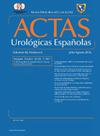Eficacia de la intervención dietética con calcio y control de oxalato en la prevención de los cálculos de oxalato cálcico: revisión integrativa
IF 1.2
4区 医学
Q3 UROLOGY & NEPHROLOGY
引用次数: 0
Abstract
Introduction
Calcium oxalate kidney stones—the most common type of renal calculi—are closely associated with dietary and metabolic factors. An appropriate dietary approach can help prevent their formation and reduce the risk of recurrence.
Objective
To evaluate the efficacy of dietary interventions involving adequate calcium intake combined with oxalate control in preventing the formation of calcium oxalate kidney stones.
Evidence acquisition
An integrative review was conducted in PubMed®, Scopus®, Medline®, and Dialnet® (2014-2024), following PRISMA guidelines, focusing on calcium and oxalate dietary management in kidney stone disease.
Evidence synthesis and conclusions
The reviewed evidence indicates that an adequate calcium intake (800-1,200 mg/day) reduces intestinal oxalate absorption and, consequently, urinary oxalate excretion. Additionally, hydration, sodium restriction, and urine alkalinization with citrate are complementary dietary strategies. Recent studies also suggest that urinary microbiota and genetic predisposition may influence individual responses to dietary interventions. Overall, a personalized dietary approach may constitute an effective and accessible strategy for the prevention of calcium oxalate kidney stones. However, the current body of evidence is limited by methodological constraints and heterogeneity across studies.
膳食钙干预和草酸盐控制预防草酸钙结石的有效性:综合综述
草酸钙肾结石是最常见的肾结石类型,与饮食和代谢因素密切相关。适当的饮食方法可以帮助预防它们的形成并降低复发的风险。目的探讨适当钙摄入与控制草酸盐摄入对预防草酸钙肾结石形成的影响。根据PRISMA指南,在PubMed®、Scopus®、Medline®和Dialnet®(2014-2024)中进行了一项综合评价,重点关注钙和草酸盐饮食管理在肾结石疾病中的作用。证据合成和结论综述的证据表明,足够的钙摄入量(800- 1200mg /天)可减少肠道草酸盐吸收,从而减少尿草酸盐排泄。此外,水合作用、限钠和用柠檬酸盐碱化尿液是补充的饮食策略。最近的研究还表明,尿微生物群和遗传易感性可能影响个体对饮食干预的反应。总的来说,个性化的饮食方法可能是预防草酸钙肾结石的一种有效和可行的策略。然而,目前的证据受到方法学约束和研究异质性的限制。
本文章由计算机程序翻译,如有差异,请以英文原文为准。
求助全文
约1分钟内获得全文
求助全文
来源期刊

Actas urologicas espanolas
UROLOGY & NEPHROLOGY-
CiteScore
1.90
自引率
0.00%
发文量
98
审稿时长
46 days
期刊介绍:
Actas Urológicas Españolas is an international journal dedicated to urological diseases and renal transplant. It has been the official publication of the Spanish Urology Association since 1974 and of the American Urology Confederation since 2008. Its articles cover all aspects related to urology.
Actas Urológicas Españolas, governed by the peer review system (double blinded), is published online in Spanish and English. Consequently, manuscripts may be sent in Spanish or English and bidirectional free cost translation will be provided.
 求助内容:
求助内容: 应助结果提醒方式:
应助结果提醒方式:


